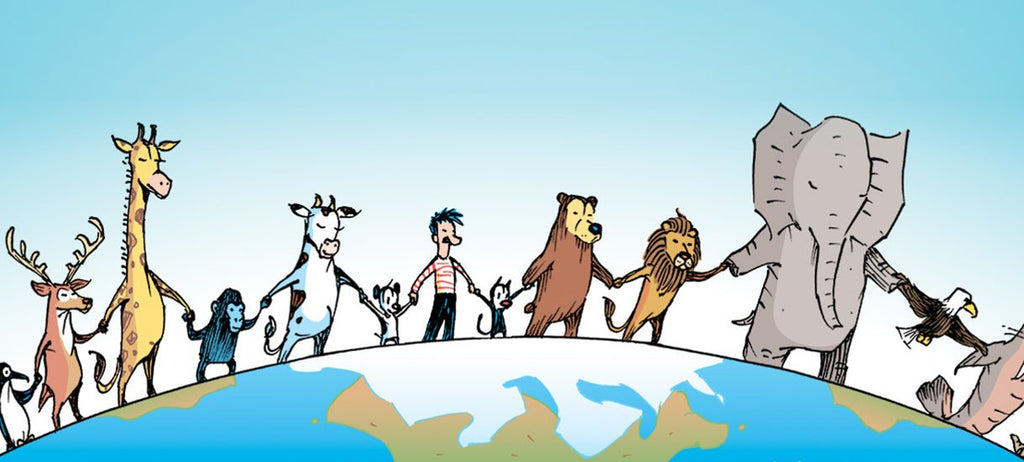The world of animal welfare can sometimes feel overwhelming. But look closer and you'll discover countless stories of hope, transformation, and communities coming together to help our furry friends. In honor of our MUTTS Manifesto "To be a positive force," we're sharing some uplifting facts about all the good happening in the world of animal rescue, plus tips on how you can continue to help!
What Is an Animal Shelter?
Animal shelters serve as temporary homes for pets in need, providing essential care, medical attention, and love until these animals find their forever families. These havens of hope come in several forms:
-
Open-admission shelters: Accept all animals regardless of health, age, or temperament
-
Limited-admission shelters: Take in animals based on space and resources
-
Municipal shelters: Operated by local governments to serve their communities
Inside a Modern Animal Shelter
For an insider's view, we spoke with Katy Hansen, Marketing & Communications Manager at Animal Care Centers of NYC. As New York City's only open-admission shelter, ACC has never turned away a single animal – regardless of health, age, temperament, or even species – and has an annual intake of around 34,000 animals.
"Last year our placement rate was 84%," says Katy. "And for the first half of 2016, we're at over 90%, one of the highest in the nation for a shelter of our size, and that's a pretty big deal."
We asked Katy about why so many people are choosing adoption, not only in New York but all across the country. Here's what we learned.
Five Positive Changes in Animal Shelters
Opinions about animal shelters are changing – for the better!
"This isn't your grandfather's pound anymore," Katy explains. ACC, like so many other shelters around the country, has implemented plenty of visitor-friendly features (such as Bunny Speed Dating) to attract potential adopters. "Instead of people fearing coming to a shelter based on preconceived notions about what a 'pound' is, they're starting to see that we're filled with compassionate staff and tons of great volunteers, and our animals are well cared for."
Animal advocates are passionate about spreading their love for shelters.
Thanks to social media, volunteers and rescuers are more vocal than ever about their love for shelters. This is important, because word-of-mouth marketing is the best kind of press a shelter can get. It drives real people through the doors to adopt real animals who need homes. It's life-saving. Even a positive review on Yelp or a nice comment on Facebook can do wonders for boosting the reputation of your local shelter, Katy explains.
Shopping for animals is the new faux pas.
Adopting isn't just better than shopping; it's also becoming more popular and socially acceptable. "There are so many articles now about puppies from puppy mills," says Katy.
"Word is getting out." Many major cities across the country—including Boston, Chicago, and Los Angeles—have even banned sales of commercially bred cats and dogs, and instead require pet stores to work with rescue groups to help customers adopt pets.
Shelters are changing for animals, too.
An increase in adoption awareness means that many shelters now have the funds and support to implement programs that improve conditions for the animals themselves.
For example, with help from partners and donors, ACC is able to maintain its Behavioral and Enrichment team, plus important programs like Dogs Playing for Life, which allows dogs to play unleashed in a fun, safe environment. Of course, ACC is just one of many shelters throughout the country whose animals benefit from local community support.
Everyone can help shelter animals.
"Every single shelter needs the same thing," Katy explains. "They need people to come in and play with the animals, to touch them and make them feel loved. They need basic amenities: towels, sheets, blankets in the wintertime, shredded paper. Even if you can't adopt, maybe you can foster, which is completely life-saving. Maybe you're a great photographer, or simply have an iPhone, which can take great pictures and videos. You can share the animals on social media. It's really endless. Everything you can imagine your pet wants, a shelter pet wants, too."
Fast Facts About Animal Shelters
Did you know? Here are some fascinating insights about animal shelters:
-
The first American animal shelter opened in 1869 in Pennsylvania
-
Most shelters provide spay/neuter services to help pet parents in their communities, and to reduce overcrowding in shelters
-
Many shelters offer behavioral training programs to help animals become more adoptable
-
Some shelters offer foster programs, allowing volunteers to give animals extra love and care while preparing them for permanent homes
-
Often, volunteer photographers help showcase animals through professional portraits
-
Some shelters partner with local schools for reading programs where children read to shelter pets
Making a Difference: Your Turn to Help
The beauty of helping shelter animals lies in the countless ways to make a difference. Every act of kindness, no matter how small, helps create positive change for animals in need. Contact your local shelter today to find out how you can help animals in your own community!
Want to stay updated about MUTTS news and more ways to help animals? Visit our homepage to sign up for our daily email.


Comments (0)